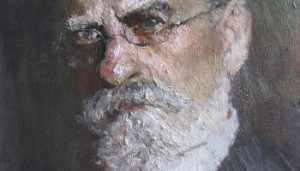 Some say 20th-century philosophy began with Edmund Husserl. He invented a new way of looking at the world. He called it “phenomenology”, meaning “how things appear”. Husserl wanted to find a foolproof method of meaning reality. Descartes‘ idea of doubting everything was a big ingredient of his philosophy. Like Descartes, he believed that consciousness is the key. And Kant‘s idea that reality was coloured by people’s view of the world was another big ingredient. Like Kant, he understood that consciousness is shaped by how the mind works. Husserl also realized something else about consciousness — it doesn’t exist in a vacuum. It is impossible to think nothing. He had discovered that “All Consciousness is Consciousness of Something.”Husserl spent 40 years of his life as a philosophy philosopher. Before this he was already highly qualified in mathematics and astronomy — subjects that nurtured a desire to apply scientific method to philosophy.
Some say 20th-century philosophy began with Edmund Husserl. He invented a new way of looking at the world. He called it “phenomenology”, meaning “how things appear”. Husserl wanted to find a foolproof method of meaning reality. Descartes‘ idea of doubting everything was a big ingredient of his philosophy. Like Descartes, he believed that consciousness is the key. And Kant‘s idea that reality was coloured by people’s view of the world was another big ingredient. Like Kant, he understood that consciousness is shaped by how the mind works. Husserl also realized something else about consciousness — it doesn’t exist in a vacuum. It is impossible to think nothing. He had discovered that “All Consciousness is Consciousness of Something.”Husserl spent 40 years of his life as a philosophy philosopher. Before this he was already highly qualified in mathematics and astronomy — subjects that nurtured a desire to apply scientific method to philosophy.
Husserl wanted to strip consciousness down to its essence to reveal how it shaped reality. Rather than doubting everything like Descartes, Husserl’s method was to push to one side (or put in brackets) all his assumptions about something and look at it afresh. He tried to step back from himself to observe consciousness working. He would then see what was left. He found that consciousness “sees” a unity in things. For example, when he looked at one side of a box (forgetting what was in it and what it was used for), his mind still anticipated the whole box.
Husserl applied the same method to abstract notions such as time (by bracketing calendars, clocks, timetables, and the like). He found that time is experienced as eternal “now”, in a flow from the past to the future — like hearing a single note, but knowing it is part of a song. Likewise, space is always “here” — wherever a person happens to be. Both “here” and “now” are personal to each individual consciousness, but everybody experiences time and space in exactly the same way.
 Husserl taught for many years at Freiburg. But because of his Jewish parentage, he was excluded after Hitler rose to power. Martin Heidegger (1889-1976) studied under Husserl at Freiburg University and later succeeded him as professor. He borrowed Husserl’s method and placed it firmly on the road to existentialism.
Husserl taught for many years at Freiburg. But because of his Jewish parentage, he was excluded after Hitler rose to power. Martin Heidegger (1889-1976) studied under Husserl at Freiburg University and later succeeded him as professor. He borrowed Husserl’s method and placed it firmly on the road to existentialism.